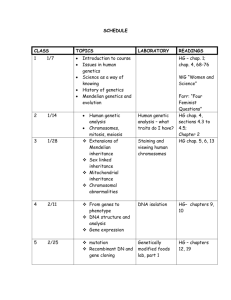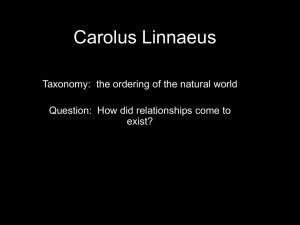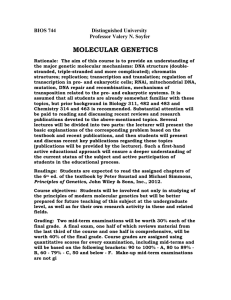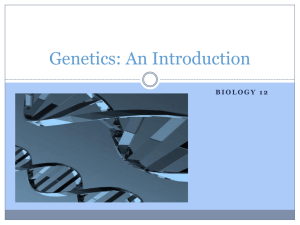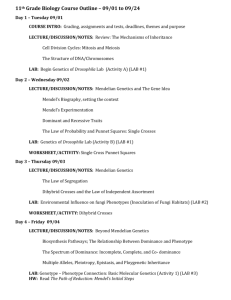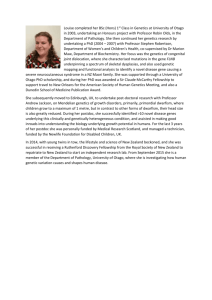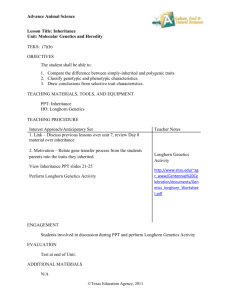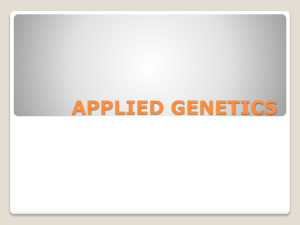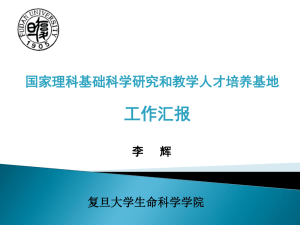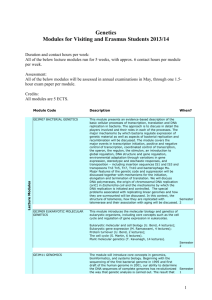York College, The City University of New York
advertisement
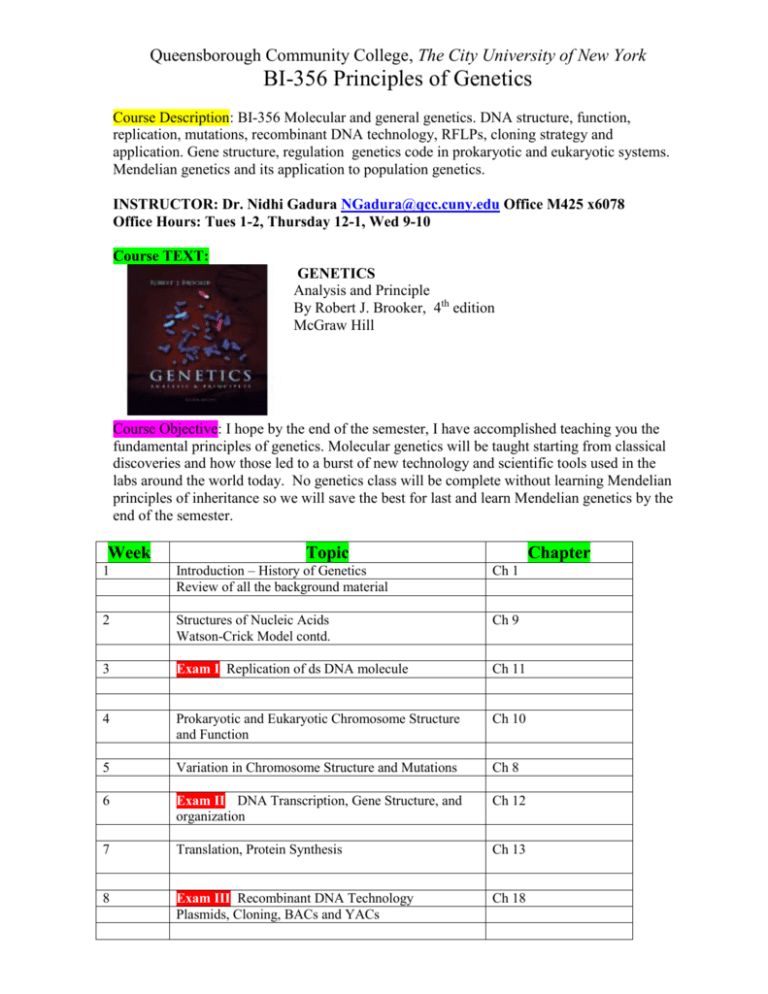
Queensborough Community College, The City University of New York BI-356 Principles of Genetics Course Description: BI-356 Molecular and general genetics. DNA structure, function, replication, mutations, recombinant DNA technology, RFLPs, cloning strategy and application. Gene structure, regulation genetics code in prokaryotic and eukaryotic systems. Mendelian genetics and its application to population genetics. INSTRUCTOR: Dr. Nidhi Gadura NGadura@qcc.cuny.edu Office M425 x6078 Office Hours: Tues 1-2, Thursday 12-1, Wed 9-10 Course TEXT: GENETICS Analysis and Principle By Robert J. Brooker, 4th edition McGraw Hill Course Objective: I hope by the end of the semester, I have accomplished teaching you the fundamental principles of genetics. Molecular genetics will be taught starting from classical discoveries and how those led to a burst of new technology and scientific tools used in the labs around the world today. No genetics class will be complete without learning Mendelian principles of inheritance so we will save the best for last and learn Mendelian genetics by the end of the semester. Week Topic Chapter 1 Introduction – History of Genetics Review of all the background material Ch 1 2 Structures of Nucleic Acids Watson-Crick Model contd. Ch 9 3 Exam I Replication of ds DNA molecule Ch 11 4 Prokaryotic and Eukaryotic Chromosome Structure and Function Ch 10 5 Variation in Chromosome Structure and Mutations Ch 8 6 Exam III DNA Transcription, Gene Structure, and organization Ch 12 7 Translation, Protein Synthesis Ch 13 8 Exam III Recombinant DNA Technology Plasmids, Cloning, BACs and YACs Ch 18 9 DNA Mutation, Damage & Repair Ch 16 10 Exam IV Prokaryotic Gene Regulation Ch 14 11 Eukaryotic Gene Regulation Ch 15 12 Exam V Mendel’s Law of Inheritance, Problem Solving, Dihybrid crosses Ch 2 13 The Chromosomal Theory of Inheritance Ch 3 14 Extensions of Mendelian Inheritance Ch 4 15 Genetic Linkage and Mapping, Chi Square Analysis Exam VI Ch 5 Grading Policy: 6 Exams - 10% each (Exams are 45 min each and start promptly DON’T be LATE for class) Homework - 20% (Graded Online HW problems on BB due Thur – Tue every week!!) 3 Writing assignments– 15% (Due Weeks 4, 7 & 13 Topics announced on BB and assignments submitted via SafeAssign on BB) Online BB Discussion Participation – 5% (You will be assigned a Group on Discussion Board, you are expected to log on every week, read assigned material and discuss the topic on BB) MAKEUP EXAMS ONLY GIVEN UPON DOCUMENTED EMERGENCY SITUATIONS. Please email NGadura@qcc.cuny.edu ASAP!! QCC Academic Integrity Policy Statement http://www.qcc.cuny.edu/Governance/AcademicSenate/COAI/Docs/Academic_Integrity _Document.pdf Cheating Citation of information not taken from the source indicated. This may include the incorrect documentation of secondary source materials Listing sources in a bibliography that are not directly used in the academic exercise Submission in a paper, thesis, lab report or other academic exercise of falsified, invented, or fictitious data or evidence, or deliberate and knowing concealment or distortion of the true nature, origin or function of such data or evidence Submitting as your own any academic exercises (e.g., written work, printing, musical composition, painting, sculpture, etc.) prepared totally or in part by another Cheating is an act or an attempted act of deception by which students seek to misrepresent that they have mastered information on an academic exercise that they have not mastered. Examples of cheating include but are not limited to: Copying from another student's test paper Allowing another student to copy from a test paper Unauthorized use of course textbook or other material such as a notebook or notes in any form to complete a test or other assignment Collaborating on a test, quiz or other project with any other person(s) without authorization Using or possessing specifically prepared but unauthorized materials during a test, e.g., notes, formula lists, notes written on the student's clothing, study aids, electronic or other devices or any unauthorized communication during an academic exercise, preparing answers or writing notes in an exam booklet before an examination. Using electronic instruments, such as cell phones, pagers, etc., to obtain or transmit or to share information, when prohibited Participating in any academic exercise such as a test using the name of another person or permitting someone else to participate in such an exercise for oneself. Students with Disabilities http://www.qcc.cuny.edu/SSD/ A student should make an initial request for accommodation to the Office of Services for Students with Disabilities, and provide appropriate supporting documentation. The Student Disabilities Services Coordinator may consult with appropriate college officials such as the instructor or provost to determine the appropriateness of the requested accommodation consistent with the program requirements. Such consultation shall be confidential, and limited to those officials whose input is necessary to the decision.
